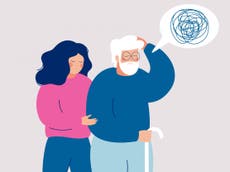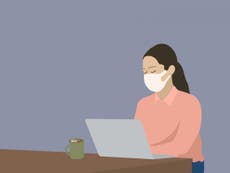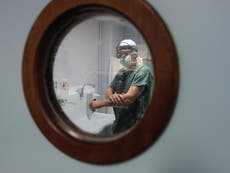One of my patients died having tested positive for coronavirus. I’m sad and angry – what if I passed it to them?
I now have symptoms. But without routine testing how am I to know whether I picked it up from the patient or a colleague, or whether I passed on the virus as an asymptomatic carrier?
I recently met a patient with a new diagnosis of an aggressive form of cancer, whose prognosis is usually measured in weeks and months. During the consultation, they were understandably frightened and tearful and I did my best to support them while trying to be honest about their situation.
At the end of the consultation, the patient’s partner, who had been stoically silent, started tearing up; their voice broke as they tried to ask me a question. The two cried together as they held each other’s hands. We agreed that chemotherapy was not the right option for treatment, and decided to prioritise the patient’s quality of life.
I made a few phone calls to get the patient transferred to my ward in oncology, thinking we would be best placed to make plans for the end-of-life care they would soon need.
I was the on-call oncologist working the following weekend, I was pleased to see the patient there when I started my shift, as were they. During the time we’d spent at our first meeting, we had built a rapport. Unfortunately, the patient had taken a serious turn for the worse. They had developed a chesty cough, shortness of breath and a fast heart rate, and was now hooked up to oxygen. The blood tests suggested an infection.
Sepsis, I concluded – most doctors know it inside out. I started intravenous antibiotics and fluids, requested blood tests, chest x-rays, urine and sputum samples. I went in to their room and explained their condition was serious, but we were treating the infection as best we could.
As I stepped out of the room, I suggested the nurse do a a novel coronavirus, or Covid-19, swab as well. It seemed prudent; we had only just had our first case on the ward. I said goodbye to the patient and finished my weekend shift, hoping their treatments would change the course of the infection.
When I came back to the ward a few days later, I was saddened to hear the patient had passed away. While discussing what to write on the death certificate with a colleague, I noted that result of the swab: positive for Covid-19. I was in shock; though the treatment would have been no different, this was likely no ordinary pneumonia.
Then it hit me: what if I had given the patient the virus as an asymptomatic carrier? I had spent hours with them in close proximity, consoling them, treating them. At no point had I worn a mask, gloves, or the plastic placebo that is our thin apron; the protocol hadn’t suggested I needed to. Worse still, even if I had wanted to, we simply didn’t have the Public Health England recommended personal protective equipment (PPE).
The guidance now looks to be changing, proving the point that NHS staff have been woefully underprotected for the last two months. Despite the government and Public Health England suggesting supplies are available, the reality on the ground is different. I frequently hear nurses frantically phoning around for masks, which are like gold dust on wards. It isn’t right.
I have since developed a fever, cough and headache, and am now at home self-isolating away from work. If I did have the virus, I will not know. I don’t know whether I picked it up from a patient, or a colleague. I don’t know if I have passed it on to my patients. A further six of my colleagues in my department are also isolating, as either they or their family members have symptoms.
Routine testing for NHS staff is still not available, though it seems to be for prime ministers or the royals. There are almost certainly asymptomatic NHS staff who could be spreading the virus to their patients and their families at this very moment.
I am incensed that those in charge have left NHS staff and our patients so vulnerable. Our NHS leaders seem quick to offer thanks and reassurance, but I wonder how quickly some of them would risk coming to the frontline without the correct PPE. In Italy, at least 40 healthcare workers have died, and more than 5,000 have been infected. We must learn from their experience.
There are now stories of my own NHS colleagues sadly dying from the virus. The government is looking to bring in 65,000 healthcare workers out of retirement. We know people in this age group, who often have their own health conditions, are among the most vulnerable.
Given the government failure to supply NHS with testing and adequate protection, they have failed not only to protect my colleagues, but the British public as well. I am angry – and worried.
The writer is a doctor working in the NHS







Join our commenting forum
Join thought-provoking conversations, follow other Independent readers and see their replies